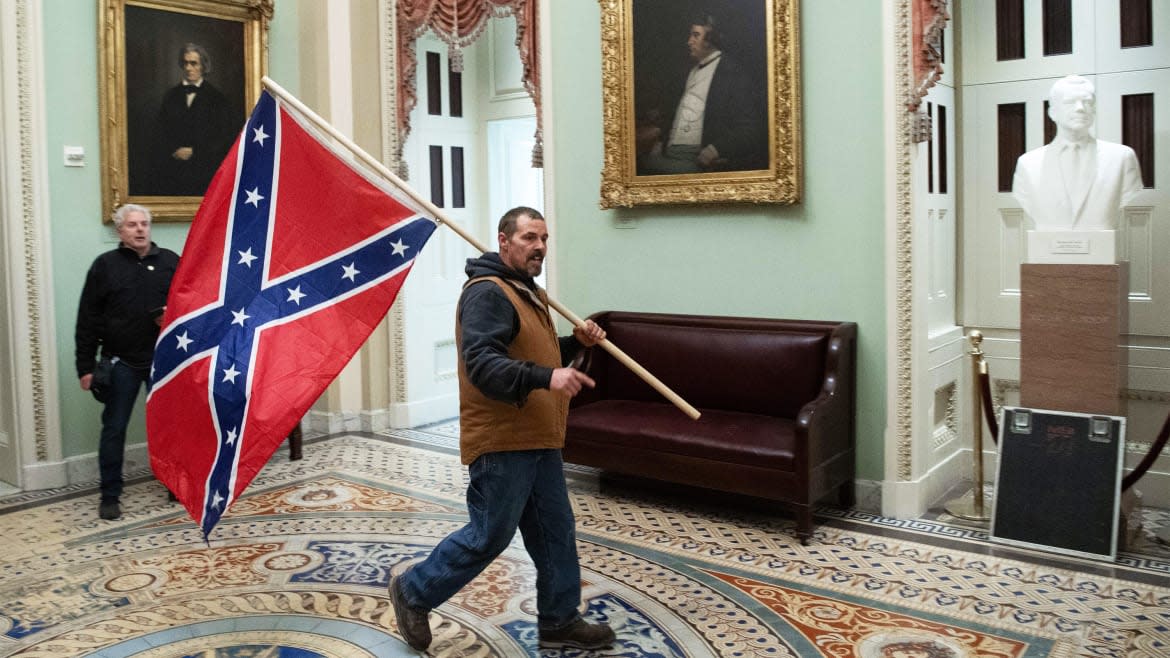Will America Ever Acknowledge Its White Supremacy Problem?

After 2020 finally ended, 2021 started out with an insurrection incited by the President of the United States and with 4,112 COVID-19 deaths in a single day. Despite hope that the new year would be a better one, it feels like nothing has changed.
George Floyd’s murder in May 2020 was followed by an intense wave of protests and countless statements rightfully identifying racism as the cause of police brutality. White people joined book clubs and communities to learn about racism and privilege. White-dominated organizations hired consultants to implement diversity, equity and inclusion training and committees. Yet, this didn’t prevent Black, Latinx and Native American persons from disproportionately dying from COVID-19. It did not stop 125 Black men from being shot and killed by police. It did not stop an insurgency led by white nationalists in our Capitol.
While we confronted a lot in 2020, we did not confront the white supremacy at the root of racism. We did not look far enough upstream to the ideas, structures, and policies that provide white people more dignity, value, recognition, and resources than BIPOC. And the violent mob of mainly white people invading the capitol with a sense of impunity in 2021 is a consequence of white supremacy. It happened because our systems entitle white people to spaces, beliefs, artifacts and actions that maintain and symbolize white oppression. It happened because we have not acknowledged the ubiquitous nature of white supremacy. We frequently limit it to police brutality or to specific events like the lethal Charlottesville rally attended by neo-Nazis, neo-Confederates, neo-fascists, Klansmen and other white nationalists.
But white supremacy operates in every system and plays out in ways to advantage people who are white, not only those we all agree are white supremacists. Starting in utero, being white brings advantages in nutrition and prenatal care. And such advantages benevolently stalk white people throughout their lives. Being white provides a better chance of going to a well-funded elementary school, living in a lead-free household, or having access to safe drinking water. When it is time to decide upon college, being white means being more likely to have family members who, having also been to college, can help navigate the choices or to be a legacy admission. It means having opportunities for internships that end up in jobs. When sick, there is likely better access to quality care and better treatment by doctors who you trust and who respect you. Being white means being more likely to grow old and having the resources to age-in-place or make the transition to a higher quality nursing home.
White people would like to believe that through hard work, they fully earned the job, income, power and status that they have. But they didn’t. By happenstance, they were born white in a racist system that privileges them and comes at a cost to BIPOC. Access to nutritious food comes at a cost to workers, both documented and undocumented. Being hired because they know someone who can “put in a good word” comes at the expense of someone else who is not well-connected to white people with power. The ability to accumulate wealth through investing in public companies is possible because these companies disproportionately employ workers of color at low pay with few benefits. Chances of aging-in-place are better because they can hire someone to clean their houses or care for their medical needs – a person who is likely to be an immigrant, Black or Latina. The ability to stay home and safe during a pandemic comes at the costs of workers of color employed in nursing homes, grocery stores or meat packing facilities.
Of course, not all white people have equal access to these resources. For example, social class, gender-identity, and sexual orientation also make us more or less likely to have access to resources regardless of race. But all white people have benefited materially and emotionally from white supremacy. All BIPOC have been harmed by white supremacy. Perhaps we don’t have the same level of outrage at all the systems that uphold white supremacy because that damage is less dramatic, and less likely to become a viral video, when it happens in our workplaces, boardrooms, clinics and hospitals – everyday happenings that disadvantage some and privilege others based on whiteness. Happenings that empower and embolden elected officials to discredit democratic processes that don’t serve their need for power. Happenings that enable white people to plan and execute an attack on the Capitol with impunity.
Banning white supremacists from social media, arresting insurrectionists and removing the president from office are all necessary responses. But these actions won’t eliminate white supremacy in 2021. Vaccines and a new administration hold promise for a better year, but they won’t dismantle white supremacy and eliminate racial inequities in COVID-19 deaths. Diversity and inclusion committees don’t dismantle white supremacy when the systems that maintain it are still in place.
Dismantling systems is difficult but not impossible. What sustains white supremacist systems are its benefits; the things that will be lost if we confront white supremacy. What are some of the personal and systemic benefits of white supremacy? Make a list. Are people who are white willing to relinquish these benefits? If not, we will stay in an endless cycle of white nationalism and fascism, viral videos of Black persons murdered by police, Black women mistreated by healthcare providers, racial disparities in COVID-19 deaths, and so on.
It is time for systemic change, or 2022 will look like 2021 will look like 2020. We must relinquish the benefits of white supremacy to see change this year and beyond.
Get our top stories in your inbox every day. Sign up now!
Daily Beast Membership: Beast Inside goes deeper on the stories that matter to you. Learn more.

